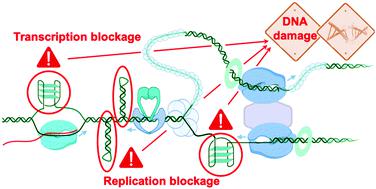当前位置:
X-MOL 学术
›
RSC Chem. Biol.
›
论文详情
Our official English website, www.x-mol.net, welcomes your
feedback! (Note: you will need to create a separate account there.)
DNA folds threaten genetic stability and can be leveraged for chemotherapy
RSC Chemical Biology ( IF 4.2 ) Pub Date : 2020-9-30 , DOI: 10.1039/d0cb00151a Joanna Zell 1 , Francesco Rota Sperti 1 , Sébastien Britton 2, 3 , David Monchaud 1
RSC Chemical Biology ( IF 4.2 ) Pub Date : 2020-9-30 , DOI: 10.1039/d0cb00151a Joanna Zell 1 , Francesco Rota Sperti 1 , Sébastien Britton 2, 3 , David Monchaud 1
Affiliation

|
Damaging DNA is a current and efficient strategy to fight against cancer cell proliferation. Numerous mechanisms exist to counteract DNA damage, collectively referred to as the DNA damage response (DDR) and which are commonly dysregulated in cancer cells. Precise knowledge of these mechanisms is necessary to optimise chemotherapeutic DNA targeting. New research on DDR has uncovered a series of promising therapeutic targets, proteins and nucleic acids, with application notably via an approach referred to as combination therapy or combinatorial synthetic lethality. In this review, we summarise the cornerstone discoveries which gave way to the DNA being considered as an anticancer target, and the manipulation of DDR pathways as a valuable anticancer strategy. We describe in detail the DDR signalling and repair pathways activated in response to DNA damage. We then summarise the current understanding of non-B DNA folds, such as G-quadruplexes and DNA junctions, when they are formed and why they can offer a more specific therapeutic target compared to that of canonical B-DNA. Finally, we merge these subjects to depict the new and highly promising chemotherapeutic strategy which combines enhanced-specificity DNA damaging and DDR targeting agents. This review thus highlights how chemical biology has given rise to significant scientific advances thanks to resolutely multidisciplinary research efforts combining molecular and cell biology, chemistry and biophysics. We aim to provide the non-specialist reader a gateway into this exciting field and the specialist reader with a new perspective on the latest results achieved and strategies devised.
中文翻译:

DNA 折叠威胁遗传稳定性并可用于化疗
破坏DNA是当前对抗癌细胞增殖的有效策略。存在多种机制来抵消 DNA 损伤,统称为 DNA 损伤反应 (DDR),在癌细胞中通常失调。准确了解这些机制对于优化化疗 DNA 靶向是必要的。 DDR 的新研究发现了一系列有前景的治疗靶点、蛋白质和核酸,特别是通过称为联合治疗或组合合成致死的方法进行应用。在这篇综述中,我们总结了 DNA 被视为抗癌靶点的基石发现,以及 DDR 通路的操纵作为一种有价值的抗癌策略。我们详细描述了响应 DNA 损伤而激活的 DDR 信号传导和修复途径。然后,我们总结了目前对非 B DNA 折叠(例如 G 四链体和 DNA 连接)的理解、它们何时形成以及为什么与经典 B-DNA 相比它们可以提供更具体的治疗靶点。最后,我们将这些主题合并起来,描述新的、非常有前途的化疗策略,该策略结合了增强特异性 DNA 损伤和 DDR 靶向药物。因此,这篇综述强调了化学生物学如何通过结合分子和细胞生物学、化学和生物物理学的坚定的多学科研究努力而带来重大的科学进步。我们的目标是为非专业读者提供进入这个令人兴奋的领域的门户,并为专业读者提供关于最新成果和制定策略的新视角。
更新日期:2020-09-30
中文翻译:

DNA 折叠威胁遗传稳定性并可用于化疗
破坏DNA是当前对抗癌细胞增殖的有效策略。存在多种机制来抵消 DNA 损伤,统称为 DNA 损伤反应 (DDR),在癌细胞中通常失调。准确了解这些机制对于优化化疗 DNA 靶向是必要的。 DDR 的新研究发现了一系列有前景的治疗靶点、蛋白质和核酸,特别是通过称为联合治疗或组合合成致死的方法进行应用。在这篇综述中,我们总结了 DNA 被视为抗癌靶点的基石发现,以及 DDR 通路的操纵作为一种有价值的抗癌策略。我们详细描述了响应 DNA 损伤而激活的 DDR 信号传导和修复途径。然后,我们总结了目前对非 B DNA 折叠(例如 G 四链体和 DNA 连接)的理解、它们何时形成以及为什么与经典 B-DNA 相比它们可以提供更具体的治疗靶点。最后,我们将这些主题合并起来,描述新的、非常有前途的化疗策略,该策略结合了增强特异性 DNA 损伤和 DDR 靶向药物。因此,这篇综述强调了化学生物学如何通过结合分子和细胞生物学、化学和生物物理学的坚定的多学科研究努力而带来重大的科学进步。我们的目标是为非专业读者提供进入这个令人兴奋的领域的门户,并为专业读者提供关于最新成果和制定策略的新视角。











































 京公网安备 11010802027423号
京公网安备 11010802027423号